Importance of International Financial Management for Unilever
VerifiedAdded on 2023/06/08
|8
|2135
|318
AI Summary
This report critically examines the importance of international financial management for Unilever, evaluates its dividend distribution policy, examines the efficient market hypothesis theory, and studies Unilever's methods of appraising projects.
Contribute Materials
Your contribution can guide someone’s learning journey. Share your
documents today.
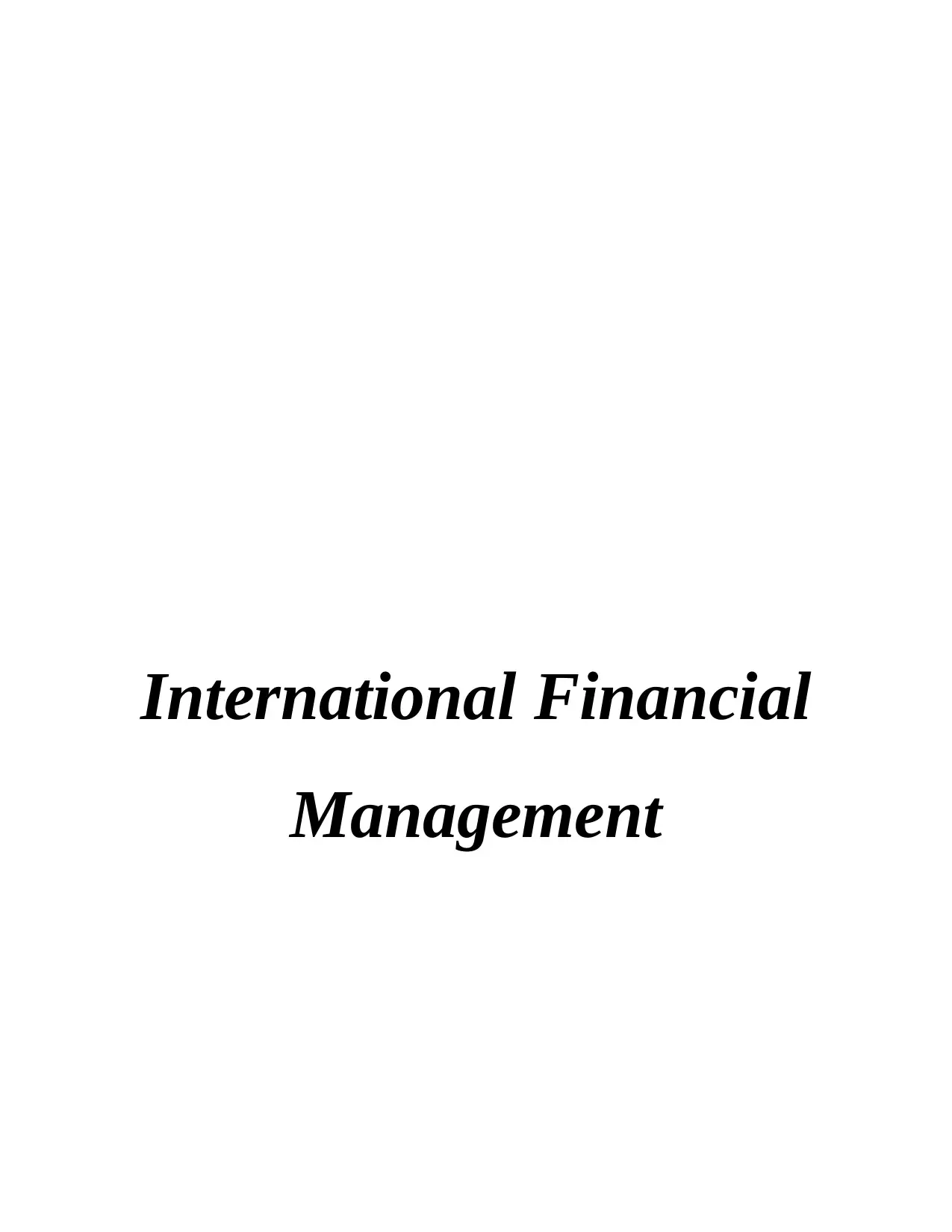
International Financial
Management
Management
Secure Best Marks with AI Grader
Need help grading? Try our AI Grader for instant feedback on your assignments.
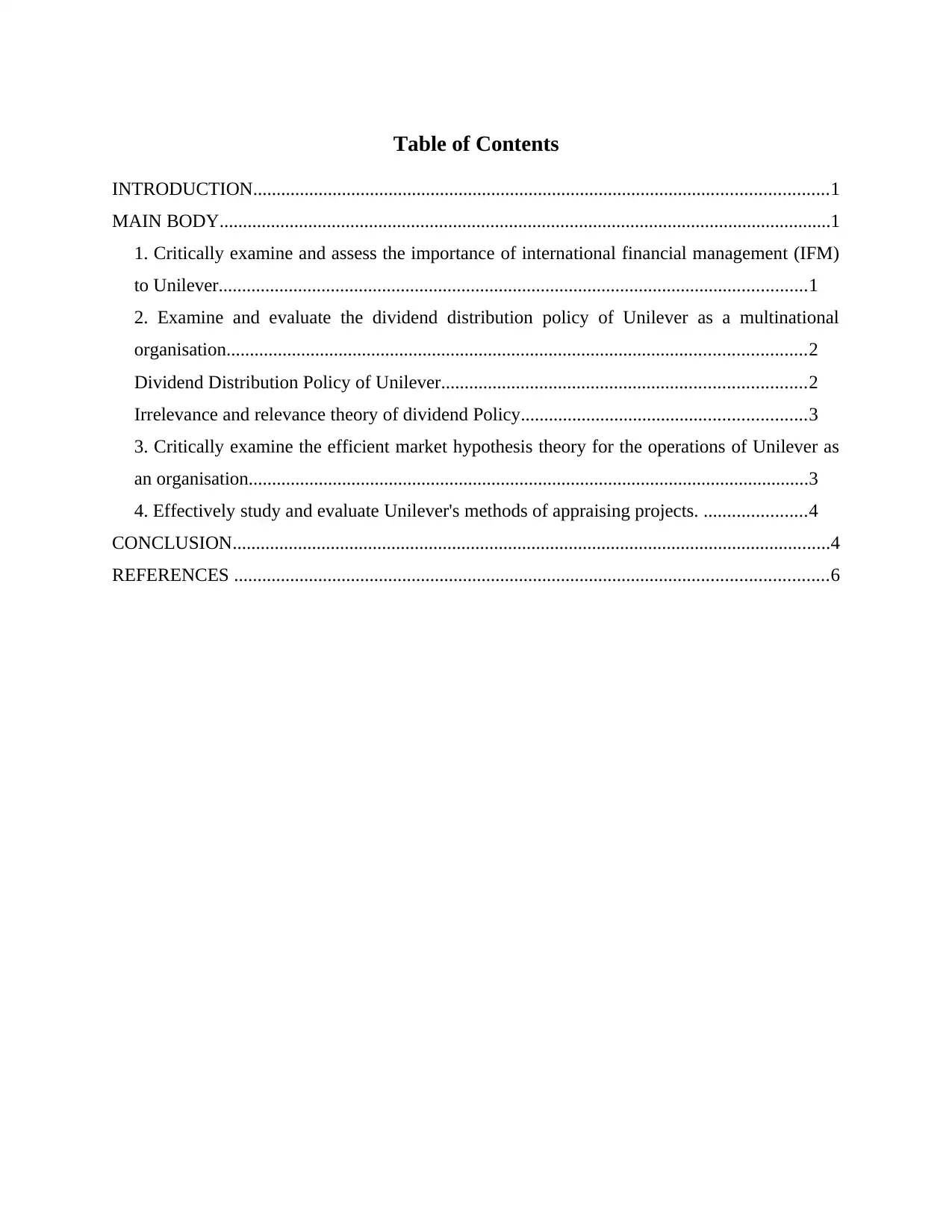
Table of Contents
INTRODUCTION...........................................................................................................................1
MAIN BODY...................................................................................................................................1
1. Critically examine and assess the importance of international financial management (IFM)
to Unilever..............................................................................................................................1
2. Examine and evaluate the dividend distribution policy of Unilever as a multinational
organisation............................................................................................................................2
Dividend Distribution Policy of Unilever..............................................................................2
Irrelevance and relevance theory of dividend Policy.............................................................3
3. Critically examine the efficient market hypothesis theory for the operations of Unilever as
an organisation........................................................................................................................3
4. Effectively study and evaluate Unilever's methods of appraising projects. ......................4
CONCLUSION................................................................................................................................4
REFERENCES ...............................................................................................................................6
INTRODUCTION...........................................................................................................................1
MAIN BODY...................................................................................................................................1
1. Critically examine and assess the importance of international financial management (IFM)
to Unilever..............................................................................................................................1
2. Examine and evaluate the dividend distribution policy of Unilever as a multinational
organisation............................................................................................................................2
Dividend Distribution Policy of Unilever..............................................................................2
Irrelevance and relevance theory of dividend Policy.............................................................3
3. Critically examine the efficient market hypothesis theory for the operations of Unilever as
an organisation........................................................................................................................3
4. Effectively study and evaluate Unilever's methods of appraising projects. ......................4
CONCLUSION................................................................................................................................4
REFERENCES ...............................................................................................................................6
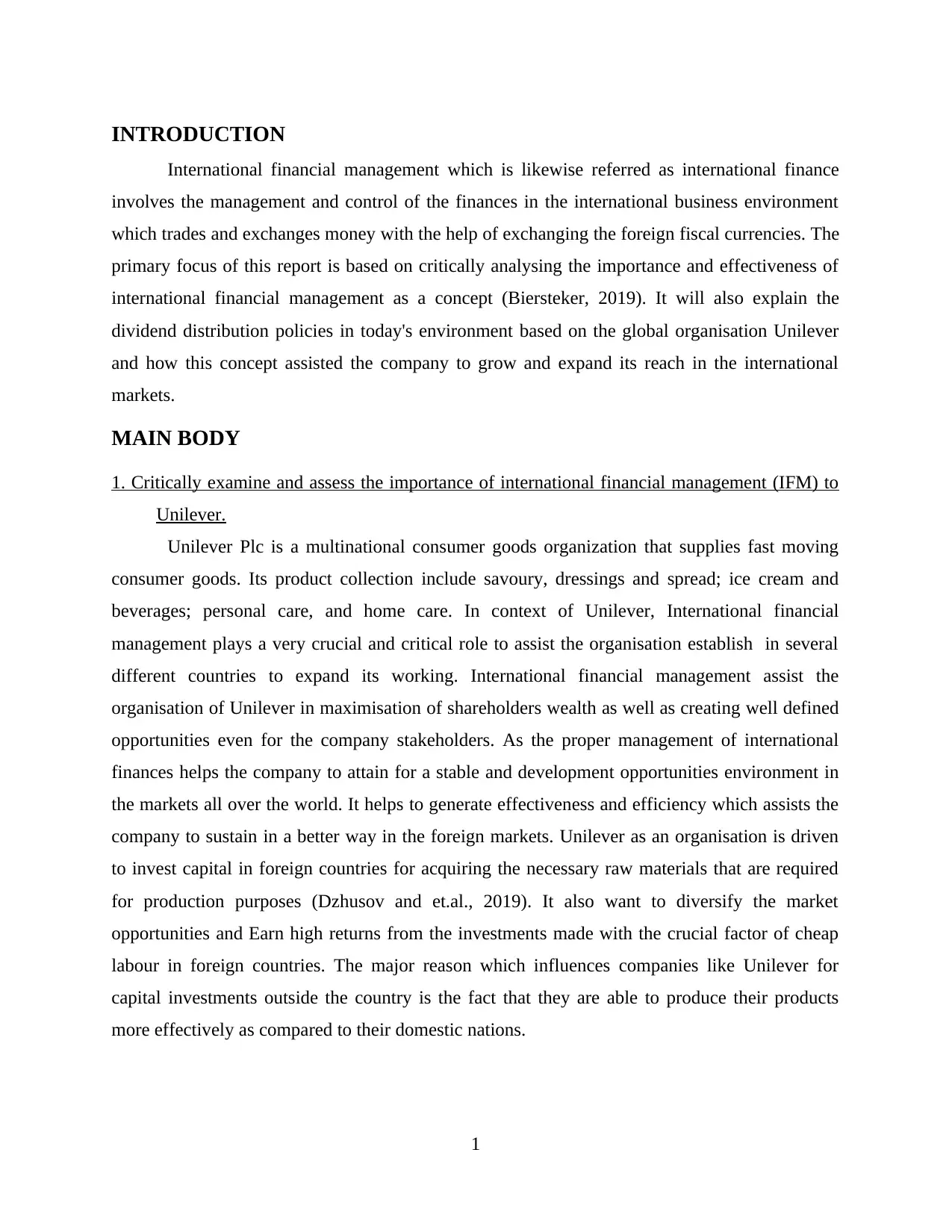
INTRODUCTION
International financial management which is likewise referred as international finance
involves the management and control of the finances in the international business environment
which trades and exchanges money with the help of exchanging the foreign fiscal currencies. The
primary focus of this report is based on critically analysing the importance and effectiveness of
international financial management as a concept (Biersteker, 2019). It will also explain the
dividend distribution policies in today's environment based on the global organisation Unilever
and how this concept assisted the company to grow and expand its reach in the international
markets.
MAIN BODY
1. Critically examine and assess the importance of international financial management (IFM) to
Unilever.
Unilever Plc is a multinational consumer goods organization that supplies fast moving
consumer goods. Its product collection include savoury, dressings and spread; ice cream and
beverages; personal care, and home care. In context of Unilever, International financial
management plays a very crucial and critical role to assist the organisation establish in several
different countries to expand its working. International financial management assist the
organisation of Unilever in maximisation of shareholders wealth as well as creating well defined
opportunities even for the company stakeholders. As the proper management of international
finances helps the company to attain for a stable and development opportunities environment in
the markets all over the world. It helps to generate effectiveness and efficiency which assists the
company to sustain in a better way in the foreign markets. Unilever as an organisation is driven
to invest capital in foreign countries for acquiring the necessary raw materials that are required
for production purposes (Dzhusov and et.al., 2019). It also want to diversify the market
opportunities and Earn high returns from the investments made with the crucial factor of cheap
labour in foreign countries. The major reason which influences companies like Unilever for
capital investments outside the country is the fact that they are able to produce their products
more effectively as compared to their domestic nations.
1
International financial management which is likewise referred as international finance
involves the management and control of the finances in the international business environment
which trades and exchanges money with the help of exchanging the foreign fiscal currencies. The
primary focus of this report is based on critically analysing the importance and effectiveness of
international financial management as a concept (Biersteker, 2019). It will also explain the
dividend distribution policies in today's environment based on the global organisation Unilever
and how this concept assisted the company to grow and expand its reach in the international
markets.
MAIN BODY
1. Critically examine and assess the importance of international financial management (IFM) to
Unilever.
Unilever Plc is a multinational consumer goods organization that supplies fast moving
consumer goods. Its product collection include savoury, dressings and spread; ice cream and
beverages; personal care, and home care. In context of Unilever, International financial
management plays a very crucial and critical role to assist the organisation establish in several
different countries to expand its working. International financial management assist the
organisation of Unilever in maximisation of shareholders wealth as well as creating well defined
opportunities even for the company stakeholders. As the proper management of international
finances helps the company to attain for a stable and development opportunities environment in
the markets all over the world. It helps to generate effectiveness and efficiency which assists the
company to sustain in a better way in the foreign markets. Unilever as an organisation is driven
to invest capital in foreign countries for acquiring the necessary raw materials that are required
for production purposes (Dzhusov and et.al., 2019). It also want to diversify the market
opportunities and Earn high returns from the investments made with the crucial factor of cheap
labour in foreign countries. The major reason which influences companies like Unilever for
capital investments outside the country is the fact that they are able to produce their products
more effectively as compared to their domestic nations.
1
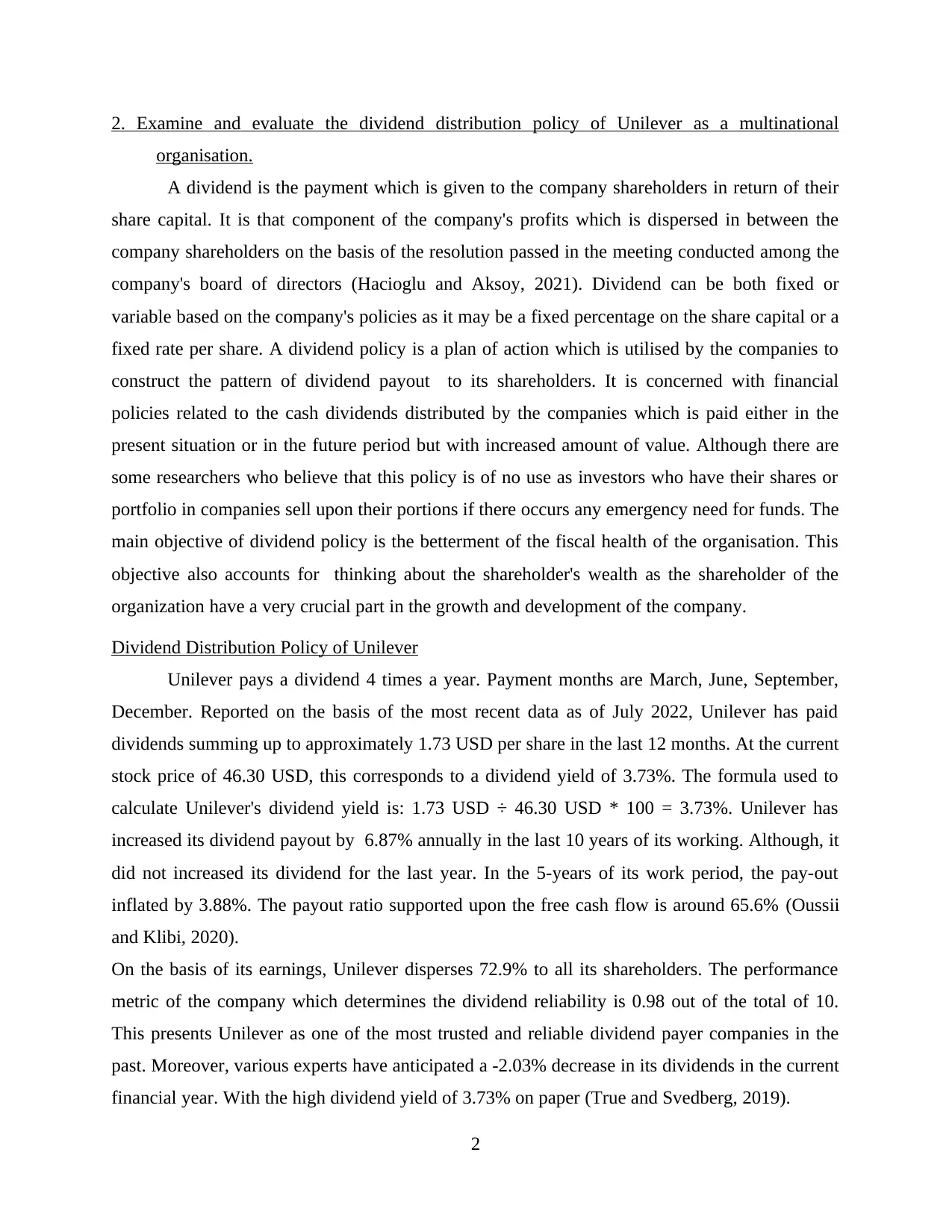
2. Examine and evaluate the dividend distribution policy of Unilever as a multinational
organisation.
A dividend is the payment which is given to the company shareholders in return of their
share capital. It is that component of the company's profits which is dispersed in between the
company shareholders on the basis of the resolution passed in the meeting conducted among the
company's board of directors (Hacioglu and Aksoy, 2021). Dividend can be both fixed or
variable based on the company's policies as it may be a fixed percentage on the share capital or a
fixed rate per share. A dividend policy is a plan of action which is utilised by the companies to
construct the pattern of dividend payout to its shareholders. It is concerned with financial
policies related to the cash dividends distributed by the companies which is paid either in the
present situation or in the future period but with increased amount of value. Although there are
some researchers who believe that this policy is of no use as investors who have their shares or
portfolio in companies sell upon their portions if there occurs any emergency need for funds. The
main objective of dividend policy is the betterment of the fiscal health of the organisation. This
objective also accounts for thinking about the shareholder's wealth as the shareholder of the
organization have a very crucial part in the growth and development of the company.
Dividend Distribution Policy of Unilever
Unilever pays a dividend 4 times a year. Payment months are March, June, September,
December. Reported on the basis of the most recent data as of July 2022, Unilever has paid
dividends summing up to approximately 1.73 USD per share in the last 12 months. At the current
stock price of 46.30 USD, this corresponds to a dividend yield of 3.73%. The formula used to
calculate Unilever's dividend yield is: 1.73 USD ÷ 46.30 USD * 100 = 3.73%. Unilever has
increased its dividend payout by 6.87% annually in the last 10 years of its working. Although, it
did not increased its dividend for the last year. In the 5-years of its work period, the pay-out
inflated by 3.88%. The payout ratio supported upon the free cash flow is around 65.6% (Oussii
and Klibi, 2020).
On the basis of its earnings, Unilever disperses 72.9% to all its shareholders. The performance
metric of the company which determines the dividend reliability is 0.98 out of the total of 10.
This presents Unilever as one of the most trusted and reliable dividend payer companies in the
past. Moreover, various experts have anticipated a -2.03% decrease in its dividends in the current
financial year. With the high dividend yield of 3.73% on paper (True and Svedberg, 2019).
2
organisation.
A dividend is the payment which is given to the company shareholders in return of their
share capital. It is that component of the company's profits which is dispersed in between the
company shareholders on the basis of the resolution passed in the meeting conducted among the
company's board of directors (Hacioglu and Aksoy, 2021). Dividend can be both fixed or
variable based on the company's policies as it may be a fixed percentage on the share capital or a
fixed rate per share. A dividend policy is a plan of action which is utilised by the companies to
construct the pattern of dividend payout to its shareholders. It is concerned with financial
policies related to the cash dividends distributed by the companies which is paid either in the
present situation or in the future period but with increased amount of value. Although there are
some researchers who believe that this policy is of no use as investors who have their shares or
portfolio in companies sell upon their portions if there occurs any emergency need for funds. The
main objective of dividend policy is the betterment of the fiscal health of the organisation. This
objective also accounts for thinking about the shareholder's wealth as the shareholder of the
organization have a very crucial part in the growth and development of the company.
Dividend Distribution Policy of Unilever
Unilever pays a dividend 4 times a year. Payment months are March, June, September,
December. Reported on the basis of the most recent data as of July 2022, Unilever has paid
dividends summing up to approximately 1.73 USD per share in the last 12 months. At the current
stock price of 46.30 USD, this corresponds to a dividend yield of 3.73%. The formula used to
calculate Unilever's dividend yield is: 1.73 USD ÷ 46.30 USD * 100 = 3.73%. Unilever has
increased its dividend payout by 6.87% annually in the last 10 years of its working. Although, it
did not increased its dividend for the last year. In the 5-years of its work period, the pay-out
inflated by 3.88%. The payout ratio supported upon the free cash flow is around 65.6% (Oussii
and Klibi, 2020).
On the basis of its earnings, Unilever disperses 72.9% to all its shareholders. The performance
metric of the company which determines the dividend reliability is 0.98 out of the total of 10.
This presents Unilever as one of the most trusted and reliable dividend payer companies in the
past. Moreover, various experts have anticipated a -2.03% decrease in its dividends in the current
financial year. With the high dividend yield of 3.73% on paper (True and Svedberg, 2019).
2
Secure Best Marks with AI Grader
Need help grading? Try our AI Grader for instant feedback on your assignments.
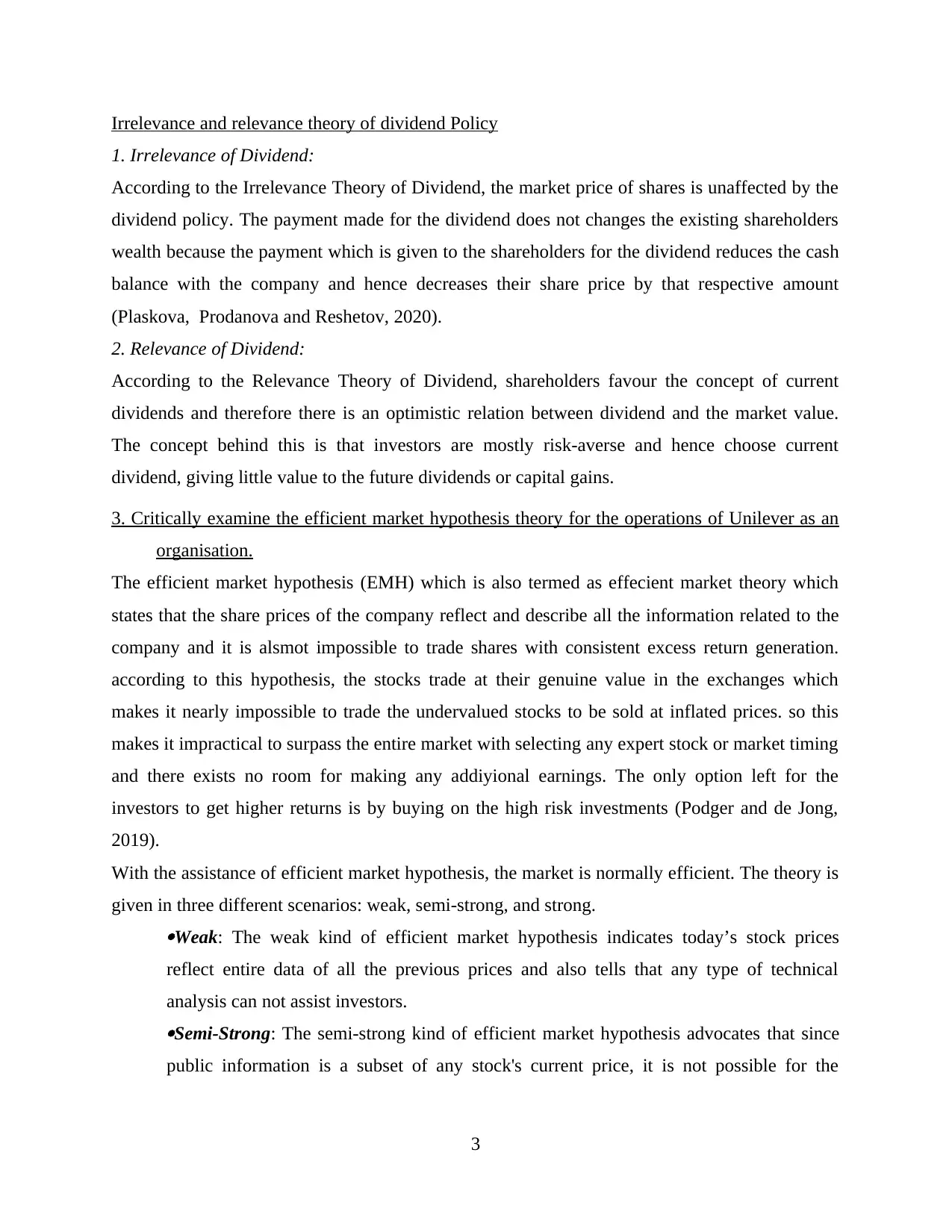
Irrelevance and relevance theory of dividend Policy
1. Irrelevance of Dividend:
According to the Irrelevance Theory of Dividend, the market price of shares is unaffected by the
dividend policy. The payment made for the dividend does not changes the existing shareholders
wealth because the payment which is given to the shareholders for the dividend reduces the cash
balance with the company and hence decreases their share price by that respective amount
(Plaskova, Prodanova and Reshetov, 2020).
2. Relevance of Dividend:
According to the Relevance Theory of Dividend, shareholders favour the concept of current
dividends and therefore there is an optimistic relation between dividend and the market value.
The concept behind this is that investors are mostly risk-averse and hence choose current
dividend, giving little value to the future dividends or capital gains.
3. Critically examine the efficient market hypothesis theory for the operations of Unilever as an
organisation.
The efficient market hypothesis (EMH) which is also termed as effecient market theory which
states that the share prices of the company reflect and describe all the information related to the
company and it is alsmot impossible to trade shares with consistent excess return generation.
according to this hypothesis, the stocks trade at their genuine value in the exchanges which
makes it nearly impossible to trade the undervalued stocks to be sold at inflated prices. so this
makes it impractical to surpass the entire market with selecting any expert stock or market timing
and there exists no room for making any addiyional earnings. The only option left for the
investors to get higher returns is by buying on the high risk investments (Podger and de Jong,
2019).
With the assistance of efficient market hypothesis, the market is normally efficient. The theory is
given in three different scenarios: weak, semi-strong, and strong.
Weak: The weak kind of efficient market hypothesis indicates today’s stock prices
reflect entire data of all the previous prices and also tells that any type of technical
analysis can not assist investors.
Semi-Strong: The semi-strong kind of efficient market hypothesis advocates that since
public information is a subset of any stock's current price, it is not possible for the
3
1. Irrelevance of Dividend:
According to the Irrelevance Theory of Dividend, the market price of shares is unaffected by the
dividend policy. The payment made for the dividend does not changes the existing shareholders
wealth because the payment which is given to the shareholders for the dividend reduces the cash
balance with the company and hence decreases their share price by that respective amount
(Plaskova, Prodanova and Reshetov, 2020).
2. Relevance of Dividend:
According to the Relevance Theory of Dividend, shareholders favour the concept of current
dividends and therefore there is an optimistic relation between dividend and the market value.
The concept behind this is that investors are mostly risk-averse and hence choose current
dividend, giving little value to the future dividends or capital gains.
3. Critically examine the efficient market hypothesis theory for the operations of Unilever as an
organisation.
The efficient market hypothesis (EMH) which is also termed as effecient market theory which
states that the share prices of the company reflect and describe all the information related to the
company and it is alsmot impossible to trade shares with consistent excess return generation.
according to this hypothesis, the stocks trade at their genuine value in the exchanges which
makes it nearly impossible to trade the undervalued stocks to be sold at inflated prices. so this
makes it impractical to surpass the entire market with selecting any expert stock or market timing
and there exists no room for making any addiyional earnings. The only option left for the
investors to get higher returns is by buying on the high risk investments (Podger and de Jong,
2019).
With the assistance of efficient market hypothesis, the market is normally efficient. The theory is
given in three different scenarios: weak, semi-strong, and strong.
Weak: The weak kind of efficient market hypothesis indicates today’s stock prices
reflect entire data of all the previous prices and also tells that any type of technical
analysis can not assist investors.
Semi-Strong: The semi-strong kind of efficient market hypothesis advocates that since
public information is a subset of any stock's current price, it is not possible for the
3
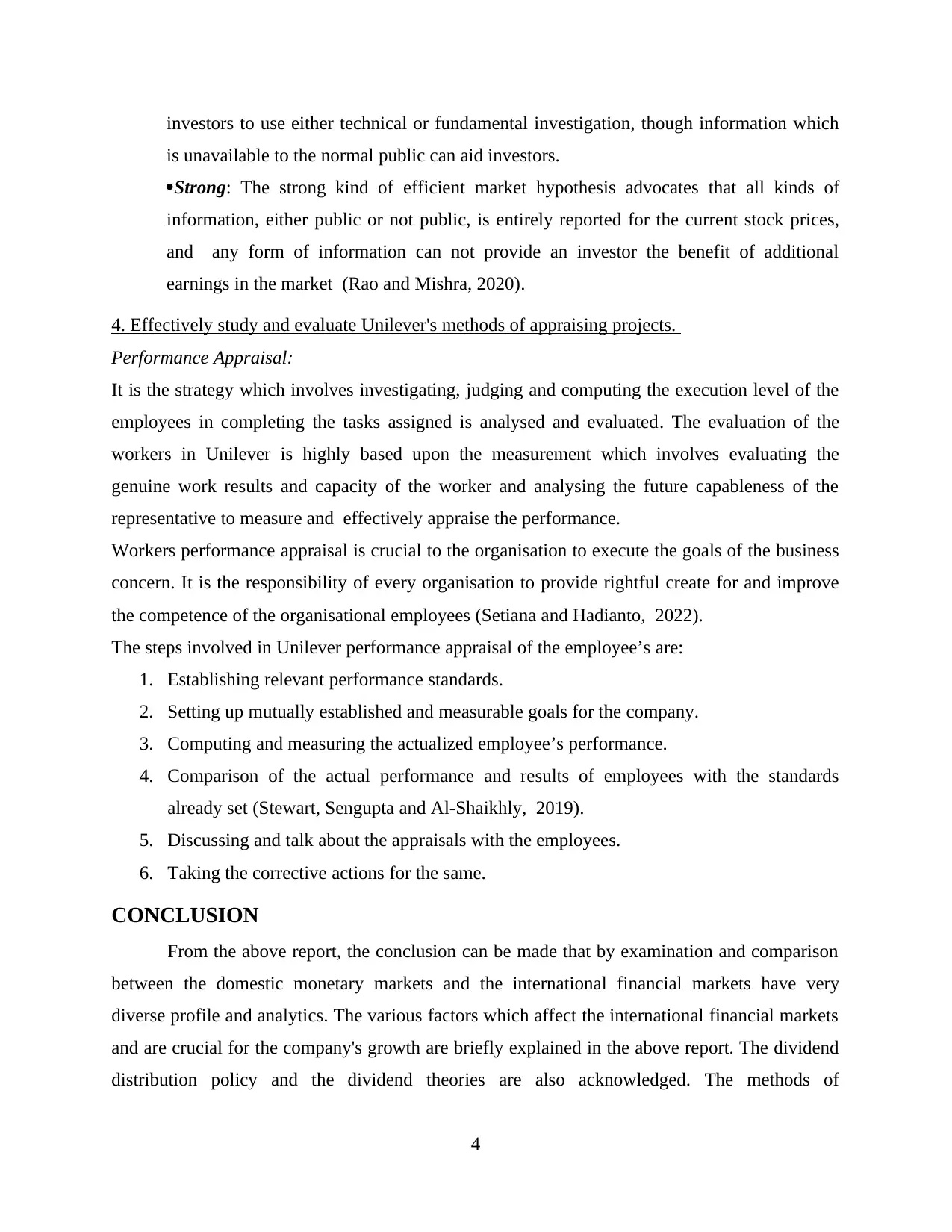
investors to use either technical or fundamental investigation, though information which
is unavailable to the normal public can aid investors.
Strong: The strong kind of efficient market hypothesis advocates that all kinds of
information, either public or not public, is entirely reported for the current stock prices,
and any form of information can not provide an investor the benefit of additional
earnings in the market (Rao and Mishra, 2020).
4. Effectively study and evaluate Unilever's methods of appraising projects.
Performance Appraisal:
It is the strategy which involves investigating, judging and computing the execution level of the
employees in completing the tasks assigned is analysed and evaluated. The evaluation of the
workers in Unilever is highly based upon the measurement which involves evaluating the
genuine work results and capacity of the worker and analysing the future capableness of the
representative to measure and effectively appraise the performance.
Workers performance appraisal is crucial to the organisation to execute the goals of the business
concern. It is the responsibility of every organisation to provide rightful create for and improve
the competence of the organisational employees (Setiana and Hadianto, 2022).
The steps involved in Unilever performance appraisal of the employee’s are:
1. Establishing relevant performance standards.
2. Setting up mutually established and measurable goals for the company.
3. Computing and measuring the actualized employee’s performance.
4. Comparison of the actual performance and results of employees with the standards
already set (Stewart, Sengupta and Al-Shaikhly, 2019).
5. Discussing and talk about the appraisals with the employees.
6. Taking the corrective actions for the same.
CONCLUSION
From the above report, the conclusion can be made that by examination and comparison
between the domestic monetary markets and the international financial markets have very
diverse profile and analytics. The various factors which affect the international financial markets
and are crucial for the company's growth are briefly explained in the above report. The dividend
distribution policy and the dividend theories are also acknowledged. The methods of
4
is unavailable to the normal public can aid investors.
Strong: The strong kind of efficient market hypothesis advocates that all kinds of
information, either public or not public, is entirely reported for the current stock prices,
and any form of information can not provide an investor the benefit of additional
earnings in the market (Rao and Mishra, 2020).
4. Effectively study and evaluate Unilever's methods of appraising projects.
Performance Appraisal:
It is the strategy which involves investigating, judging and computing the execution level of the
employees in completing the tasks assigned is analysed and evaluated. The evaluation of the
workers in Unilever is highly based upon the measurement which involves evaluating the
genuine work results and capacity of the worker and analysing the future capableness of the
representative to measure and effectively appraise the performance.
Workers performance appraisal is crucial to the organisation to execute the goals of the business
concern. It is the responsibility of every organisation to provide rightful create for and improve
the competence of the organisational employees (Setiana and Hadianto, 2022).
The steps involved in Unilever performance appraisal of the employee’s are:
1. Establishing relevant performance standards.
2. Setting up mutually established and measurable goals for the company.
3. Computing and measuring the actualized employee’s performance.
4. Comparison of the actual performance and results of employees with the standards
already set (Stewart, Sengupta and Al-Shaikhly, 2019).
5. Discussing and talk about the appraisals with the employees.
6. Taking the corrective actions for the same.
CONCLUSION
From the above report, the conclusion can be made that by examination and comparison
between the domestic monetary markets and the international financial markets have very
diverse profile and analytics. The various factors which affect the international financial markets
and are crucial for the company's growth are briefly explained in the above report. The dividend
distribution policy and the dividend theories are also acknowledged. The methods of
4
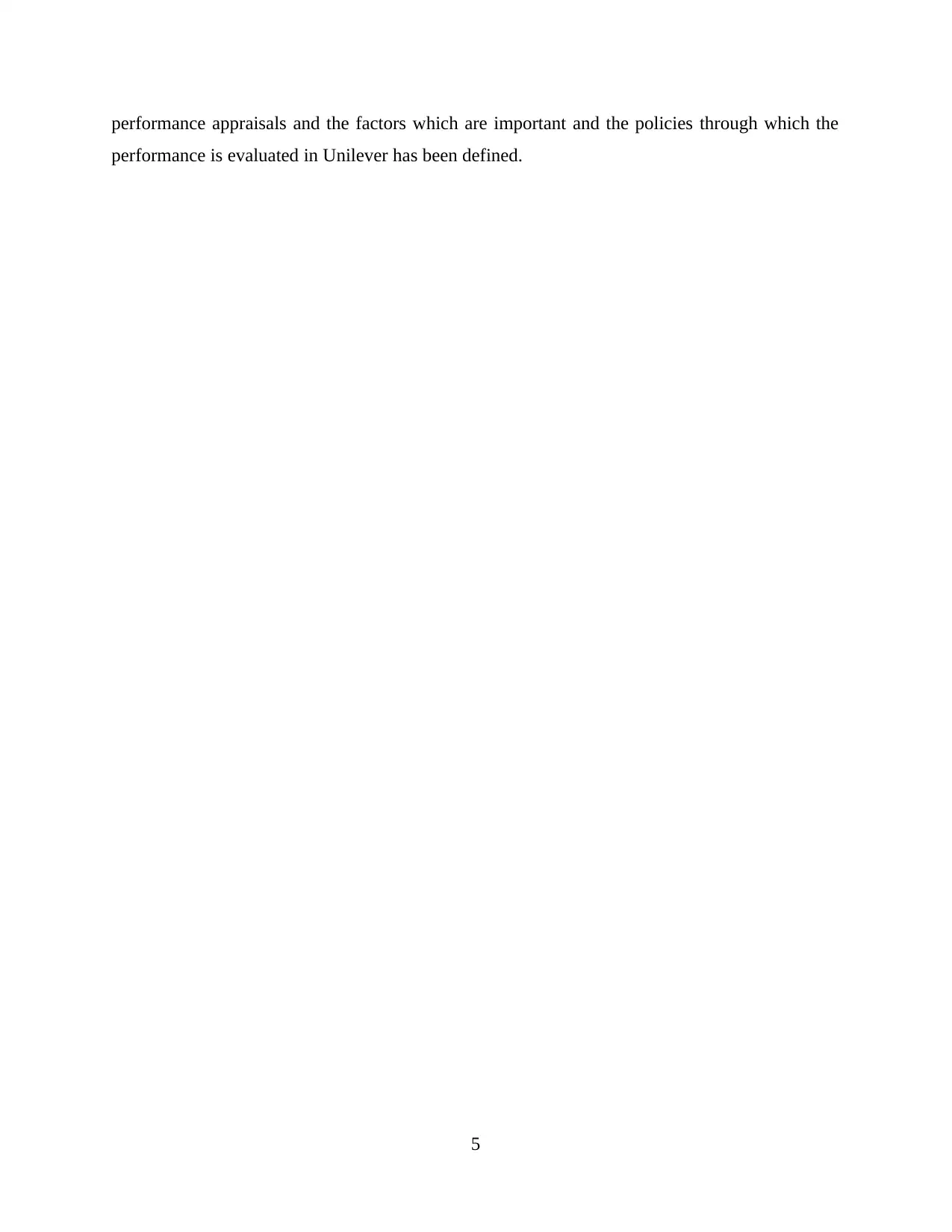
performance appraisals and the factors which are important and the policies through which the
performance is evaluated in Unilever has been defined.
5
performance is evaluated in Unilever has been defined.
5
Paraphrase This Document
Need a fresh take? Get an instant paraphrase of this document with our AI Paraphraser
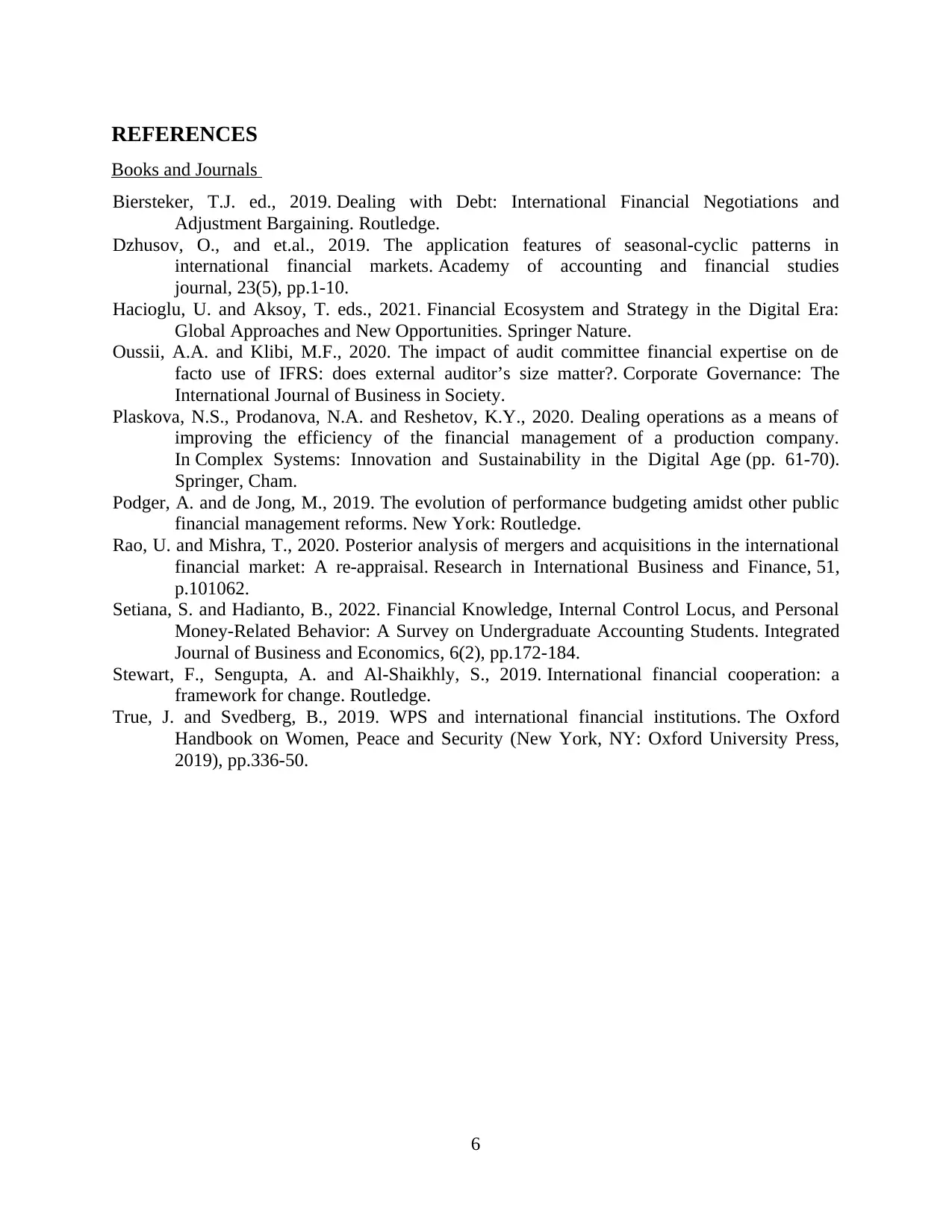
REFERENCES
Books and Journals
Biersteker, T.J. ed., 2019. Dealing with Debt: International Financial Negotiations and
Adjustment Bargaining. Routledge.
Dzhusov, O., and et.al., 2019. The application features of seasonal-cyclic patterns in
international financial markets. Academy of accounting and financial studies
journal, 23(5), pp.1-10.
Hacioglu, U. and Aksoy, T. eds., 2021. Financial Ecosystem and Strategy in the Digital Era:
Global Approaches and New Opportunities. Springer Nature.
Oussii, A.A. and Klibi, M.F., 2020. The impact of audit committee financial expertise on de
facto use of IFRS: does external auditor’s size matter?. Corporate Governance: The
International Journal of Business in Society.
Plaskova, N.S., Prodanova, N.A. and Reshetov, K.Y., 2020. Dealing operations as a means of
improving the efficiency of the financial management of a production company.
In Complex Systems: Innovation and Sustainability in the Digital Age (pp. 61-70).
Springer, Cham.
Podger, A. and de Jong, M., 2019. The evolution of performance budgeting amidst other public
financial management reforms. New York: Routledge.
Rao, U. and Mishra, T., 2020. Posterior analysis of mergers and acquisitions in the international
financial market: A re-appraisal. Research in International Business and Finance, 51,
p.101062.
Setiana, S. and Hadianto, B., 2022. Financial Knowledge, Internal Control Locus, and Personal
Money-Related Behavior: A Survey on Undergraduate Accounting Students. Integrated
Journal of Business and Economics, 6(2), pp.172-184.
Stewart, F., Sengupta, A. and Al-Shaikhly, S., 2019. International financial cooperation: a
framework for change. Routledge.
True, J. and Svedberg, B., 2019. WPS and international financial institutions. The Oxford
Handbook on Women, Peace and Security (New York, NY: Oxford University Press,
2019), pp.336-50.
6
Books and Journals
Biersteker, T.J. ed., 2019. Dealing with Debt: International Financial Negotiations and
Adjustment Bargaining. Routledge.
Dzhusov, O., and et.al., 2019. The application features of seasonal-cyclic patterns in
international financial markets. Academy of accounting and financial studies
journal, 23(5), pp.1-10.
Hacioglu, U. and Aksoy, T. eds., 2021. Financial Ecosystem and Strategy in the Digital Era:
Global Approaches and New Opportunities. Springer Nature.
Oussii, A.A. and Klibi, M.F., 2020. The impact of audit committee financial expertise on de
facto use of IFRS: does external auditor’s size matter?. Corporate Governance: The
International Journal of Business in Society.
Plaskova, N.S., Prodanova, N.A. and Reshetov, K.Y., 2020. Dealing operations as a means of
improving the efficiency of the financial management of a production company.
In Complex Systems: Innovation and Sustainability in the Digital Age (pp. 61-70).
Springer, Cham.
Podger, A. and de Jong, M., 2019. The evolution of performance budgeting amidst other public
financial management reforms. New York: Routledge.
Rao, U. and Mishra, T., 2020. Posterior analysis of mergers and acquisitions in the international
financial market: A re-appraisal. Research in International Business and Finance, 51,
p.101062.
Setiana, S. and Hadianto, B., 2022. Financial Knowledge, Internal Control Locus, and Personal
Money-Related Behavior: A Survey on Undergraduate Accounting Students. Integrated
Journal of Business and Economics, 6(2), pp.172-184.
Stewart, F., Sengupta, A. and Al-Shaikhly, S., 2019. International financial cooperation: a
framework for change. Routledge.
True, J. and Svedberg, B., 2019. WPS and international financial institutions. The Oxford
Handbook on Women, Peace and Security (New York, NY: Oxford University Press,
2019), pp.336-50.
6
1 out of 8
Your All-in-One AI-Powered Toolkit for Academic Success.
+13062052269
info@desklib.com
Available 24*7 on WhatsApp / Email
![[object Object]](/_next/static/media/star-bottom.7253800d.svg)
Unlock your academic potential
© 2024 | Zucol Services PVT LTD | All rights reserved.



